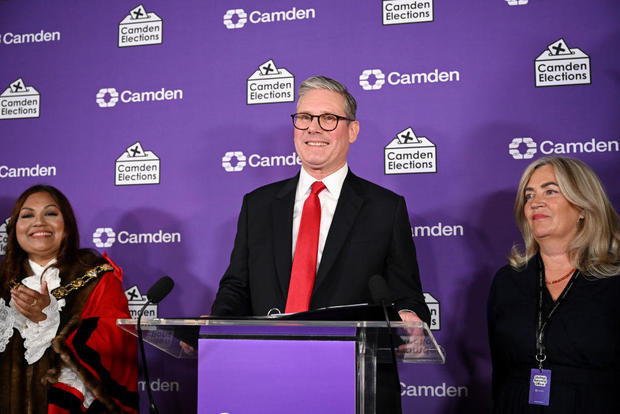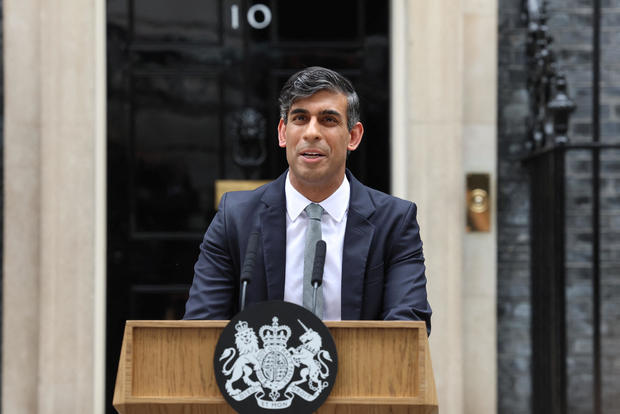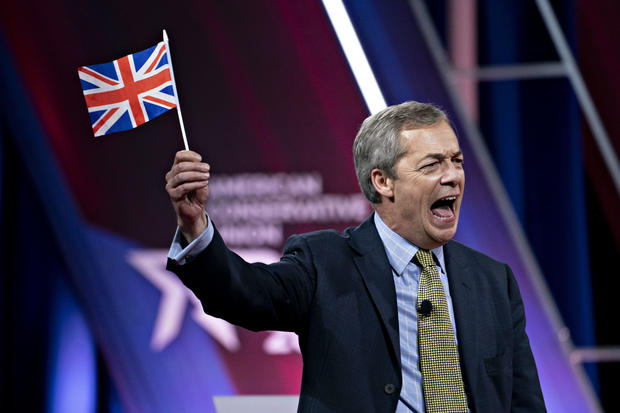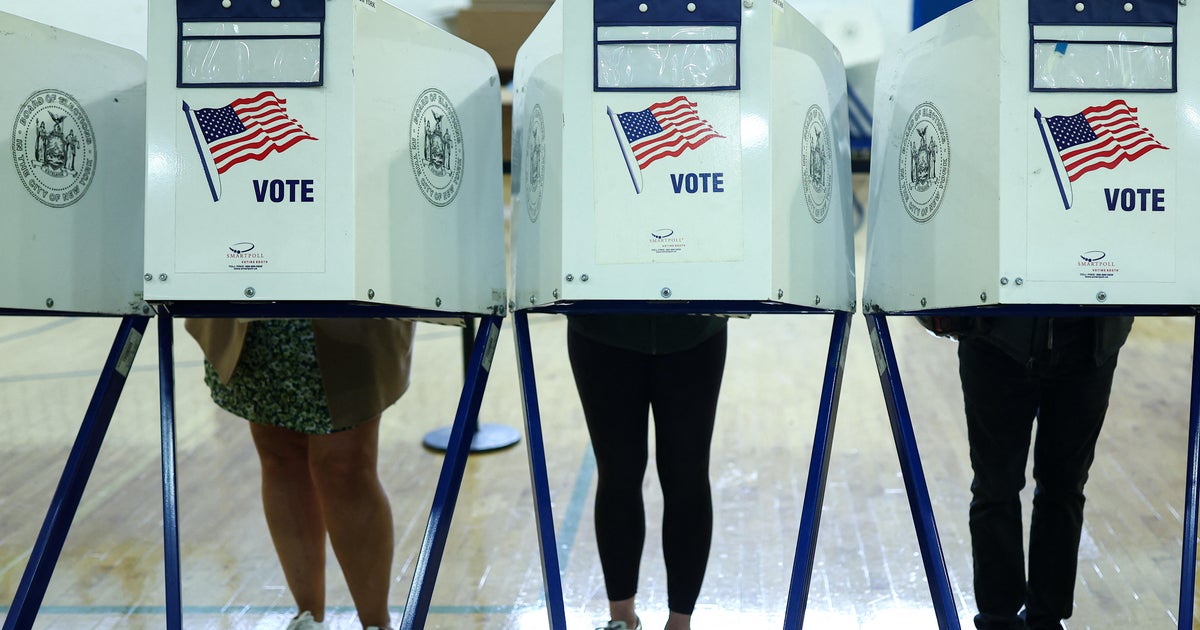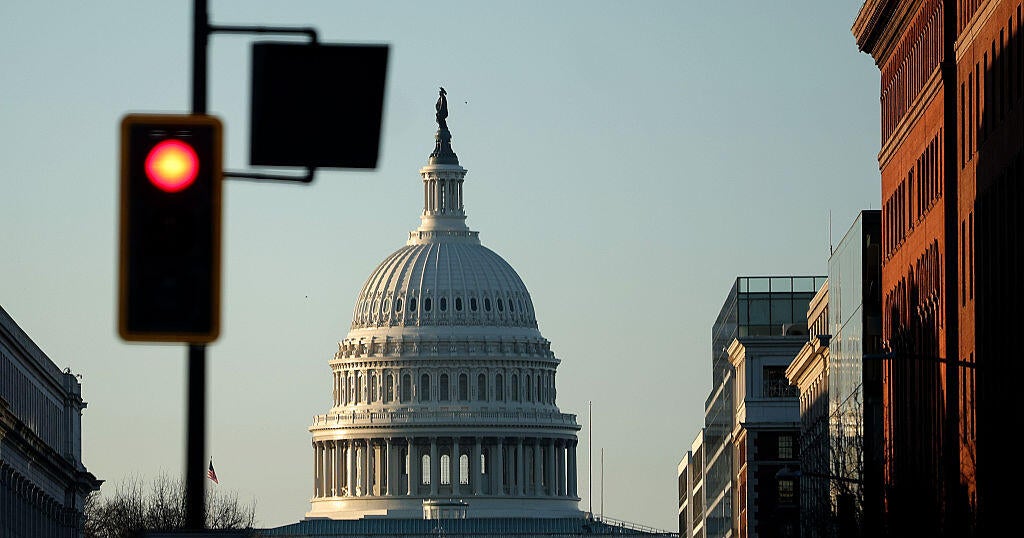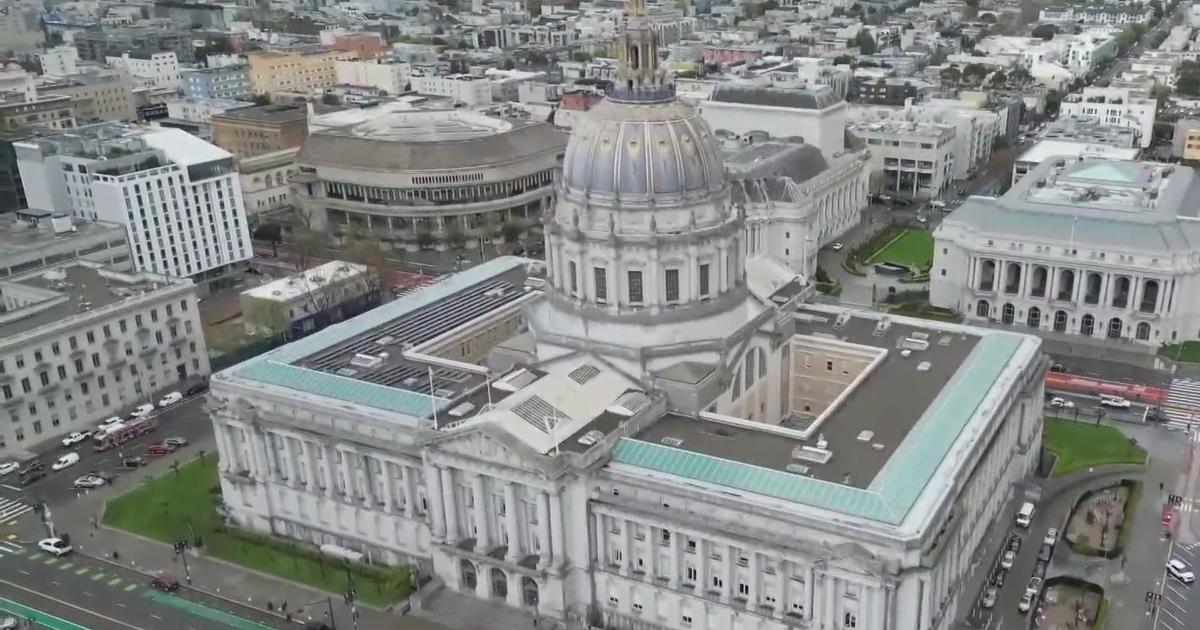Keir Starmer becomes U.K. prime minister after his Labour Party wins huge majority in general election
London — Britain's Labour Party swept to power Friday after more than a decade in opposition, as a jaded electorate handed the party a landslide victory — but also a mammoth task of reinvigorating a stagnant economy and dispirited nation. Labour Party Leader Keir Starmer officially became prime minister later Friday, leading his party back to government less than five years after it suffered its worst defeat in almost a century.
In the merciless choreography of British politics, he took charge in 10 Downing Street hours after Thursday's votes were counted — as Conservative leader Rishi Sunak hustled out.
With all but two of the individual election results in, Labour had won 412 seats in the 650-seat House of Commons and the Conservatives 121.
"A mandate like this comes with a great responsibility," Starmer acknowledged in a speech to supporters, saying that the fight to regain people's trust after years of disillusionment "is the battle that defines our age."
Speaking as dawn broke in London, he said Labour would offer "the sunlight of hope, pale at first but getting stronger through the day."
Sunak conceded defeat, saying voters had delivered a "sobering verdict." Speaking later, outside 10 Downing Street for the last time as the country's leader, Sunak took personal responsibility for his party's devastating loss.
"First and foremost, I am sorry," Sunak said. "I have given this job my all, but you have sent a clear signal that the government of the U.K. must change, and yours is the only judgment that matters. I have heard your anger, your disappointment, and I take responsibility for this loss."
For Starmer, it's a massive triumph that will bring huge challenges, as he faces a weary electorate impatient for change against a gloomy backdrop of economic malaise, mounting distrust in institutions and a fraying social fabric.
"Nothing has gone well in the last 14 years," said London voter James Erskine, who was optimistic for change in the hours before polls closed. "I just see this as the potential for a seismic shift, and that's what I'm hoping for."
And that's what Starmer promised, saying "change begins now."
As thousands of electoral staff tallied millions of ballot papers at counting centers across the country, the Conservatives absorbed the shock of a historic defeat that will leave the depleted party in disarray and likely spark a contest to replace Sunak as leader.
While the result bucks recent rightward electoral shifts in Europe, including in France and Italy, many of those same populist undercurrents flow in Britain. Reform UK leader Nigel Farage has roiled the race with his party's anti-immigrant "take our country back" sentiment and undercut support for the Conservatives, who already faced dismal prospects.
A key unknown going into the election was whether Farage's hard-right party could convert its success in grabbing attention into more than a handful of seats in Parliament. With virtually all constituencies having declared their results on Friday, Reform had taken five seats — fewer than predicted by the exit poll released the previous evening, but a victory for the relatively new party which had zero heading into he election.
While the U.K.'s voting system makes it hard for smaller parties to gain parliamentary seats, the overall vote share for Reform was a significant 15%, making it the third most popular party at the polls on Thursday despite the distribution of seats in the House of Commons, and highlighting the challenge for the two major parties, which both lost some seats to Farage's Reform.
Speaking to CBS News on Friday morning London Mayor Sadiq Khan, a Labour politician, acknowledged the rise of "popular nativist, nationalist movements," and he said Starmer would try to show that he was governing "in the national interest. Show humility. Be magnanimous and be humble over the course of the next three, four, five years. We've got to earn the trust of
those that voted Labour, but also try and win the confidence of those that didn't."
Former Conservative leader William Hague accepted the results were "a catastrophic result in historic terms for the Conservative Party."
Britain has experienced a run of turbulent years — some of it of the Conservatives' own making and some of it not — that has left many voters pessimistic about their country's future. The U.K.'s exit from the European Union followed by the COVID-19 pandemic and Russia's invasion of Ukraine battered the economy, while lockdown-breaching parties held by then-Prime Minister Boris Johnson and his staff caused widespread anger.
Johnson's successor, Liz Truss, rocked the economy further with a package of drastic tax cuts and lasted just 49 days in office. Rising poverty and cuts to state services have led to gripes about "Broken Britain."
Hundreds of communities were locked in tight contests in which traditional party loyalties come second to more immediate concerns about the economy, crumbling infrastructure and the National Health Service.
In Henley-on-Thames, about 40 miles west of London, voters like Patricia Mulcahy, who is retired, sensed the nation was looking for something different. The community, which normally votes Conservative, may change its stripes this time.
"The younger generation are far more interested in change,'' Mulcahy said. "So, I think whatever happens in Henley, in the country, there will be a big shift. But whoever gets in, they've got a heck of a job ahead of them. It's not going to be easy."
Anand Menon, professor of European Politics and Foreign Affairs at King's College London, said British voters were about to see a marked change in political atmosphere from the tumultuous "politics as pantomime" of the last few years.
"I think we're going to have to get used again to relatively stable government, with ministers staying in power for quite a long time, and with government being able to think beyond the very short term to medium-term objectives," he said.
In the first hour polls were open, Sunak made the short journey from his home to vote at Kirby Sigston Village Hall in northern England. He arrived with his wife, Akshata Murty, and walked hand-in-hand into the village hall, which is surrounded by rolling fields.
Hours later, Starmer walked with his wife, Victoria, into a polling place in north London to cast his vote.
Labour didn't set pulses racing with its pledges to get the sluggish economy growing, invest in infrastructure and make Britain a "clean energy superpower."
But nothing really went wrong in its campaign, either. The party won the support of large chunks of the business community and endorsements from traditionally conservative newspapers, including the Rupert Murdoch-owned Sun tabloid, which praised Starmer for "dragging his party back to the center ground of British politics."
The Conservatives, meanwhile, were plagued by gaffes. The campaign got off to an inauspicious start when rain drenched Sunak as he made the announcement outside 10 Downing St. Then, Sunak went home early from commemorations in France marking the 80th anniversary of the D-Day invasion.
Several Conservatives close to Sunak are being investigated over suspicions they used inside information to place bets on the date of the election before it was announced.
Sunak has struggled to shake off the taint of political chaos and mismanagement that's gathered around the Conservatives.
But for many voters, the lack of trust applies not just to the governing party, but to politicians in general.
"I don't know who's for me as a working person," said Michelle Bird, a port worker in Southampton on England's south coast who was undecided about whether to vote Labour or Conservative in the days before the elections. "I don't know whether it's the devil you know or the devil you don't."
